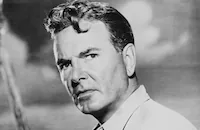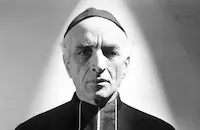Bagdad
Brief Synopsis
Cast & Crew
Charles Lamont
Maureen O'hara
Paul Christian
Vincent Price
John Sutton
Jeff Corey
Film Details
Technical Specs

Synopsis
After years of living in England, Bedouin princess Marjan looks forward to reuniting with her father, a sheik, in her native land. While riding through the desert, she and her entourage, which is led by Pasha Ali Nadim, the military governor of the region, are stopped by the Black Robes, a band of well-armed rebel Bedouins. As the pasha passively watches, the Black Robes seize the entourage's firearms and flee. The pasha then departs for Bagdad to report the raid, leaving Marjan to complete the journey on her own. When Marjan arrives at her father's camp, she learns from his trusted aide, Mohammed Jad, that he was brutally executed by the Black Robes sometime before. Jad also informs Marjan that Prince Ahmed Khabar, the Emir's son, is the suspected leader of the Black Robes and ordered her father's assassination. Marjan swears revenge against Ahmed and heads for Bagdad to demand an audience with the pasha. Unknown to Marjan, the European-educated Ahmed was in the pasha's entourage, disguised as camel driver named Hassan, and is now discussing the Black Robes with his cousin, Prince Raizul, in the citadel of Bagdad. Raizul accuses Ahmed of being in cahoots with the Black Robes and tries to convince him to return to Constantinople to stand trial. Ahmed refuses, and later, at Raizul's urging, the pasha orders his men to kill Ahmed. The pasha then meets with Marjan, who agrees to put herself under his "protection" at the citadel. That evening, at a European-style café frequented by the pasha and Raizul, Ahmed, still calling himself Hassan, but now posing as a jewel merchant, sits down at Marjan's table, having outsmarted the pasha's would-be assassins. The pasha does not reveal Ahmed's true identity to Marjan, and both he and Ahmed present her with jewels. In order to obtain more information about the Black Robes, Marjan then insists on becoming a singer at the café. A week later, Marjan slips away from the citadel to deliver the pasha's jewels to Jad, and on her way back to the café, she again encounters Ahmed, now disguised as a beggar, but fails to recognize him. Later, Marjan, who is attracted to the mysterious "Hassan," questions the pasha about him and learns that he is actually Ahmed. Still bent on revenge, Marjan puts aside her feelings and coaxes a promise from the lovestruck pasha that the Bedouins will be allowed to kill the prince. To that end, Marjan tries to trap Ahmed one night, but he anticipates her trick. Soon after, Ahmed's father and other elders meet at the citadel, and all agree that Ahmed must stand trial in Constantinople. Marjan is furious at the news and, feeling that the pasha has betrayed her, calls him a coward. In retaliation, the pasha strikes Marjan, prompting Jad to attack him. Before Jad and Marjan can kill the pasha, however, the Black Robes, led surreptiously by Raizul, attack the citadel. In the confusion, Marjan and Jad kidnap Ahmed and hold him prisoner in their desert camp. Marjan's plans for Ahmed's execution are stymied when Raizul, the pasha and his men arrive, and Marjan sees that Raizul is riding her father's distinctive stallion. Although Ahmed implicates his cousin as her father's killer, Marjan demands further proof. Aware that the Emir, Raizul, the pasha and the other elders are camped in a nearby oasis, Marjan, Jad and Ahmed join a gypsy group and don their clothing. In disguise, Marjan charms the pasha's soldiers, who are revealed to be Black Robes, while extracting information from them. Deducing that Raizul is planning to kill the elders that night and thereby take control of the country, Marjan laces the soldiers' food with juice from a poisonous plant. After the soldiers begin to take sick, Ahmed escapes on one of their horses and races for help. Marjan is discovered and taken prisoner along with Jad and the gypsies. Determined to know the whereabouts of Ahmed, the pasha begins executing the gypsies in brutal fashion. As he is about to execute Marjan, Ahmed and his army ride up and attack. During the mêlée, Ahmed kills Raizul with his sword, and once the Black Robes are defeated, a grateful Marjan awards Ahmed with a kiss.

Director
Charles Lamont
Cast

Maureen O'hara
Paul Christian

Vincent Price

John Sutton

Jeff Corey

Frank Puglia
David Wolfe

Fritz Leiber
Otto Waldis
Leon Belasco
Ann Pearce

Paul Maxey
Dewey Robinson
Crew
Glenn E. Anderson
Robert Hardy Andrews
Robert Arthur
John Austin
Howard Banks
Neal Beckner
Pat Betz
Jack Brooks
Robert Brower
Leslie I. Carey
Fred Cavens
Morgan Cox
Russell A. Gausman
Alexander Golitzen
Bernard Herzbrun
Jesse Hibbs
Lester Horton
Tamara Hovey
Emile Lavigne
Bella Lewitzky
Russell Metty
Max Nippel
Dean Paup
Russell Schoengarth
Milton Schwarzwald
Mahmud Shaikhaly
Frank Skinner
Fae Smith
Joan St. Oegger
Charles Stallings
Bud Westmore
Yvonne Wood

Videos
Movie Clip


Film Details
Technical Specs

Articles
Bagdad
A few years earlier, Bagdad might have starred fan favorite Maria Montez, the Dominican beauty who top-lined 1942's similar Arabian Nights, also for Universal. But by this time, Montez had moved to Europe with her husband, French actor Jean-Pierre Aumont, where she appeared in French, German and Italian movies before dying in 1951. She had done much to popularize these kinds of Technicolor escapist films, however, and Universal now tried using Maureen O'Hara, even having her perform some native dances and sing three songs.
In her memoir, O'Hara recalled that "a scorpion stung me a few days into the shoot, but other than that, it was an uneventful experience... It's one of those films that I point to as part of my decorative years, but audiences loved them. Bagdad made Universal a fortune, and Universal purchased part of my contract from Fox as a result of that success." Soon O'Hara was making great movies for John Ford, like Rio Grande (1950) and The Quiet Man (1952), but she also returned to this kind of picture in Universal's Flame of Araby (1951).
In their book on Vincent Price, authors James Robert Parish and Steven Whitney have written, "Every actor has certain films in his career that he hopes will be lost for all time through some kind act of God. One of Vincent's is surely Bagdad, a cloak-and-dagger entry geared to show off the cinematic beauty of redheaded Maureen O'Hara in a juvenile romantic adventure yarn. Price displayed no restraint in enacting the wicked Pasha, a lascivious, avaricious, comic-strip figure. As Price reasoned, 'People love to see a man enjoying his work.'"
Bagdad was shot in the Alabama Hills of Lone Pine, Calif., the same location used for so many westerns and adventure stories over the years, like Seven Men from Now (1956) and Gunga Din (1939). It's impossible to take a bad shot there, and the scenery, costumes and color go a long way toward making Bagdad fun to watch.
The New York Times seemed to agree, declaring, "O'Hara is permitted to look her decorative best in an array of colorful and enticingly designed costumes." As for Price, the reviewer described him in his role as "friendly as a cobra."
Producer: Robert Arthur, Morgan Cox
Director: Charles Lamont
Screenplay: Robert Hardy Andrews, Tamara Hovey (story)
Cinematography: Russell Metty
Film Editing: Russell F. Schoengarth
Art Direction: Alexander Golitzen, Bernard Herzbrun
Music: Jack Brooks, Frank Skinner
Cast: Maureen O'Hara (Princess Marjan), Paul Hubschmid (Hassan), Vincent Price (Pasha Ali Nadim), John Sutton (Raizul), Jeff Corey (Mohammed Jao), Frank Puglia (Saleel).
C-82m.
by Jeremy Arnold

Bagdad
Quotes
Trivia
Notes
Hollywood Reporter news items provide the following information about the production: In November 1948, Robert Arthur replaced Leonard Goldstein as producer. Tony Martin was set to star in this picture with Yvonne De Carlo. De Carlo was assigned to another picture in mid-May 1949, and Martin was replaced by Paul Christian, who made his American film debut in the picture. Universal borrowed Maureen O'Hara from Twentieth Century-Fox for the production. Donna Martell, George Lewis, Stan Jolley, Crane Whitley, Valerie Mark and Baynes Barron were announced as cast members, but their appearance in the final film has not been confirmed. Location shooting took place in Lone Pine and Vasquez Rocks in Chatsworth, CA.














